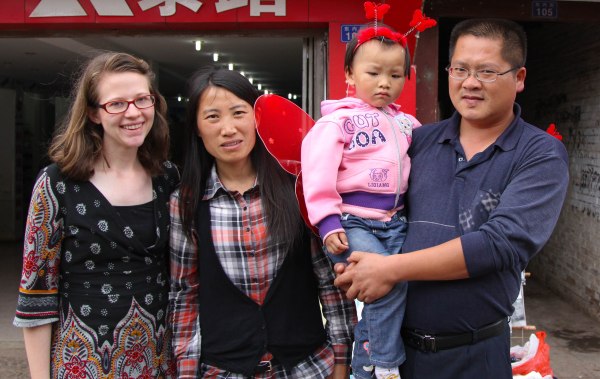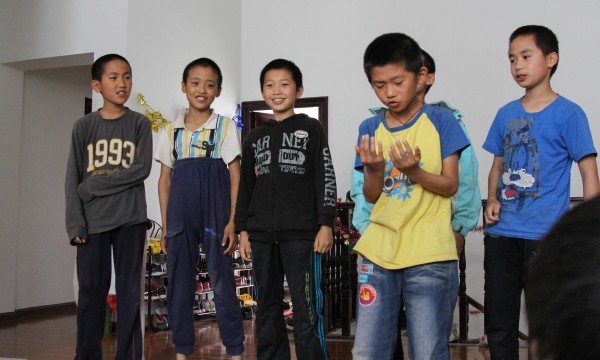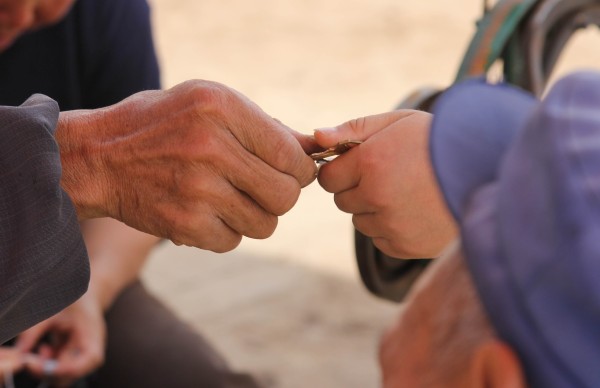On Saturday the students go outside the school for outings and adventures. Sometimes they camp on one of the nearby mountains or go into the city. This Saturday, I went with a class of the older girls to a calligraphy lesson in Huize. The ground floor of the townhouse was furnished with two pingpong tables and a few armchairs. The master, a man named Mr. Yu, smoked out of a water pipe.
The girls settled down around the tables to begin their practice as they imitated the characters Mr. Xho had demonstrated on graph paper. As if I needed another reason to fail at this art, I naturally use the wrong hand. I learned this the first time I came to China during a bamboo painting lesson when the teacher snatched the brush out of my left hand and put it into my right. This time I guiltily switched between right and left only to find that the results were equally bad. “To control the brush you must have inner peace,” I am told.


In the middle of the lesson one of the teachers and a student, Daphne, and I went across the street to visit a Chinese doctor. Daphne is the 13-year-old daughter of the principal and she learns traditional Chinese medicine when she can from a Chinese doctor named Ms. Duan. Although she lives in Nagu, Ms. Duan is also in Huize to treat a patient today and we have been invited to observe. I am told she is particularly good at setting breaks, even managing to piece together shattered bones without the help of x-rays.
When we arrived at the townhouse, Ms. Duan and the patient, a teenage boy, were already seated on the couch with concerned family members crowded around. She let Daphne feel the boy’s exposed back and asked her opinion. It is not bruised, but something in the lower back is sticking out slightly.
It’s difficult for the students and even the teachers to talk with me about Chinese medicine. There are so many body parts to translate and plants and medicines that don’t even have English names. Beyond that, Chinese medicine is based a completely different understanding of the world. I’ve barely begun to understand the concepts yin and yang, so I’m not very clear about how they affect my liver. But this time we have the use of a Chinese dictionary and finally translate the word we’re looking for: cartilage. Cartilage is sticking out of his back.
To move the “cartilage” back in place Ms. Duan and another man helped him stand up. They rocked him back and forth by the shoulders and hips. After they sat him back down on the couch, he seemed light-headed and even faint. Ms. Duan gave him water mixed with a white powder to drink. She explained his faintness was a side effect of moving the cartilage back into place. It was as if she unblocked a pipe and too much blood rushed to his head.
After the young man was bandaged up and ready to go, we returned to catch the end of the calligraphy lesson. It’s the last lesson of the regular school year and the girls will not return until the fall. Mr. Yu graciously painted something just for me — the first line of the Dao De Jing. Then we all go to lunch at a nearby restaurant.


By far the best thing about this lunch was the girls’ reaction to a dish of raw salmon. The students sat at one table while the adult table included the teachers and a few friends from Huize. Both tables were served with a dish of pink salmon slices on ice. At first the girls hardly touched the salmon, but mid-way through the meal the principal came over and told them he expected them to eat it all. This was a very expensive dish, he said, and it was important that they be exposed to new things, whether they liked it or not. And so began Wheel of Fortune, seafood edition. Many Chinese restaurants have a Lazy Susan on the table so dishes can rotate around the table. The girls decided that they would spin it and whoever landed closest to the fish would have to eat a piece before spinning again. Eventually it disappeared, but not without a number of giggles and groans from that side of the room.
After dinner we climbed a mountain called Golden Bell Mountain. The name comes from a legend that says nine dragons once terrorized this town, but a powerful king was able trap them under a huge golden bell which eventually became the mountain. It’s a local tourist site, with stone steps all the way up to a Daoist temple at the top. Along the way I was impressed by the way their teacher, Ms. Bai, allowed and even encouraged them to climb things. Instead of the expected, “Get off that, you could fall off and get hurt,” she took the time to let anyone who wanted to try climb some of the rock walls along the path.




After our climbing time, we took a walk down Old Street, where new shoe shops have taken over the old buildings of 50 or 60 years ago. The girls stood in line and ordered a drink that was described to me as “bean milk.” Oh, soy beans, soy milk. Not quite. Dried red beans and small round green beans or even corn are ground up in to a powder and mixed for a kind of warm, slightly sweet bean smoothie. I was not very optimistic about this, but it wasn’t bad at all.

































































